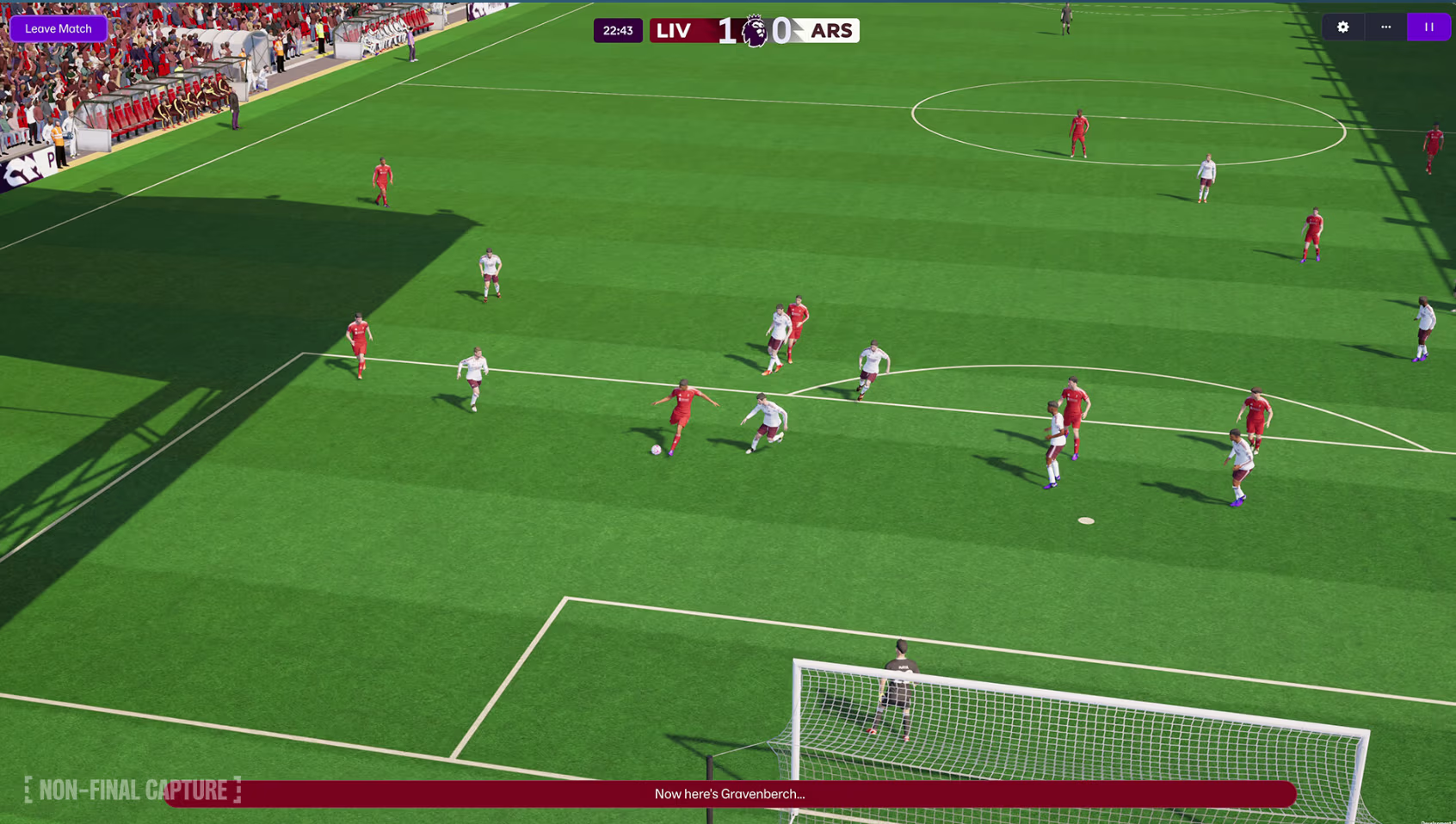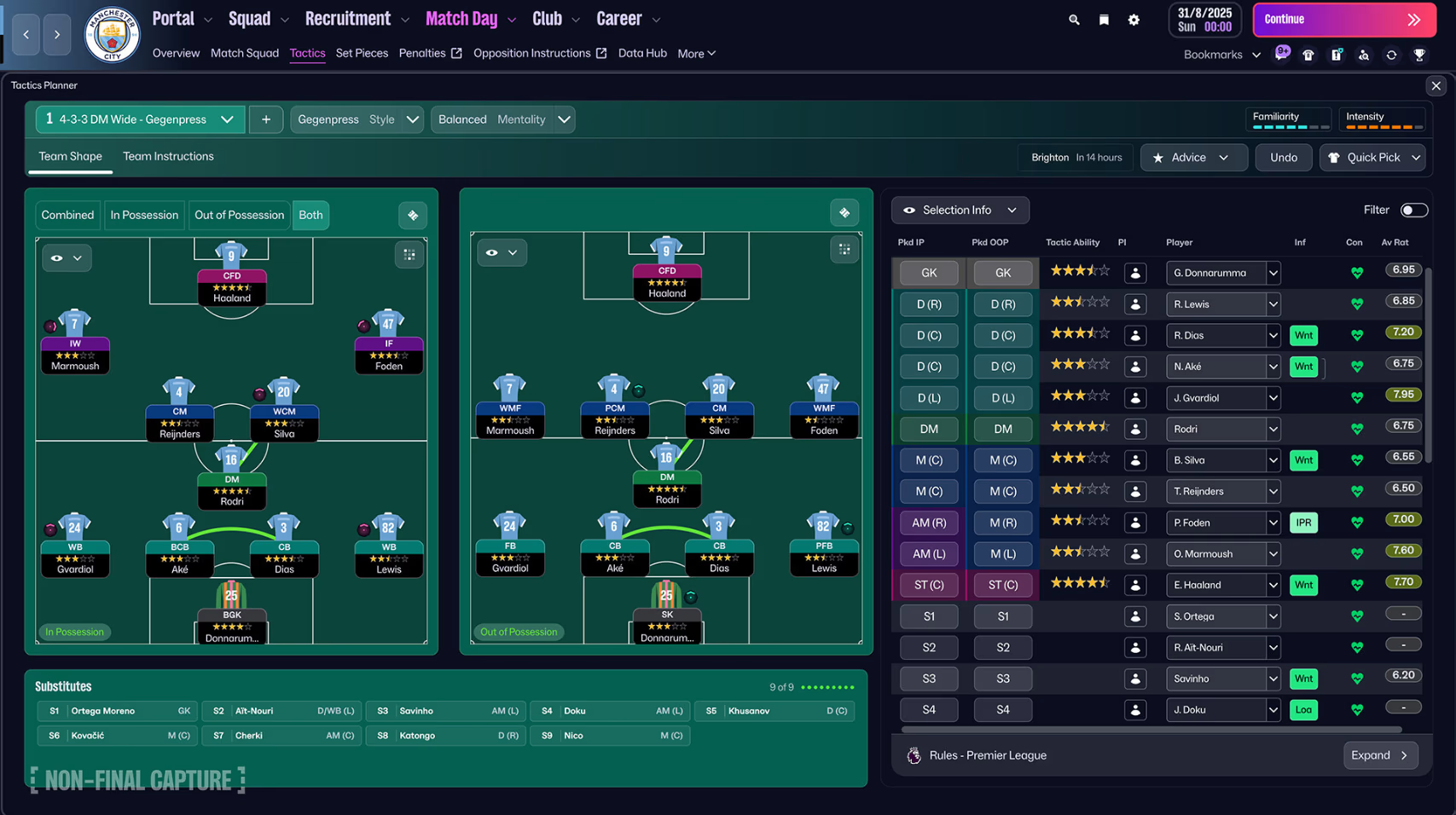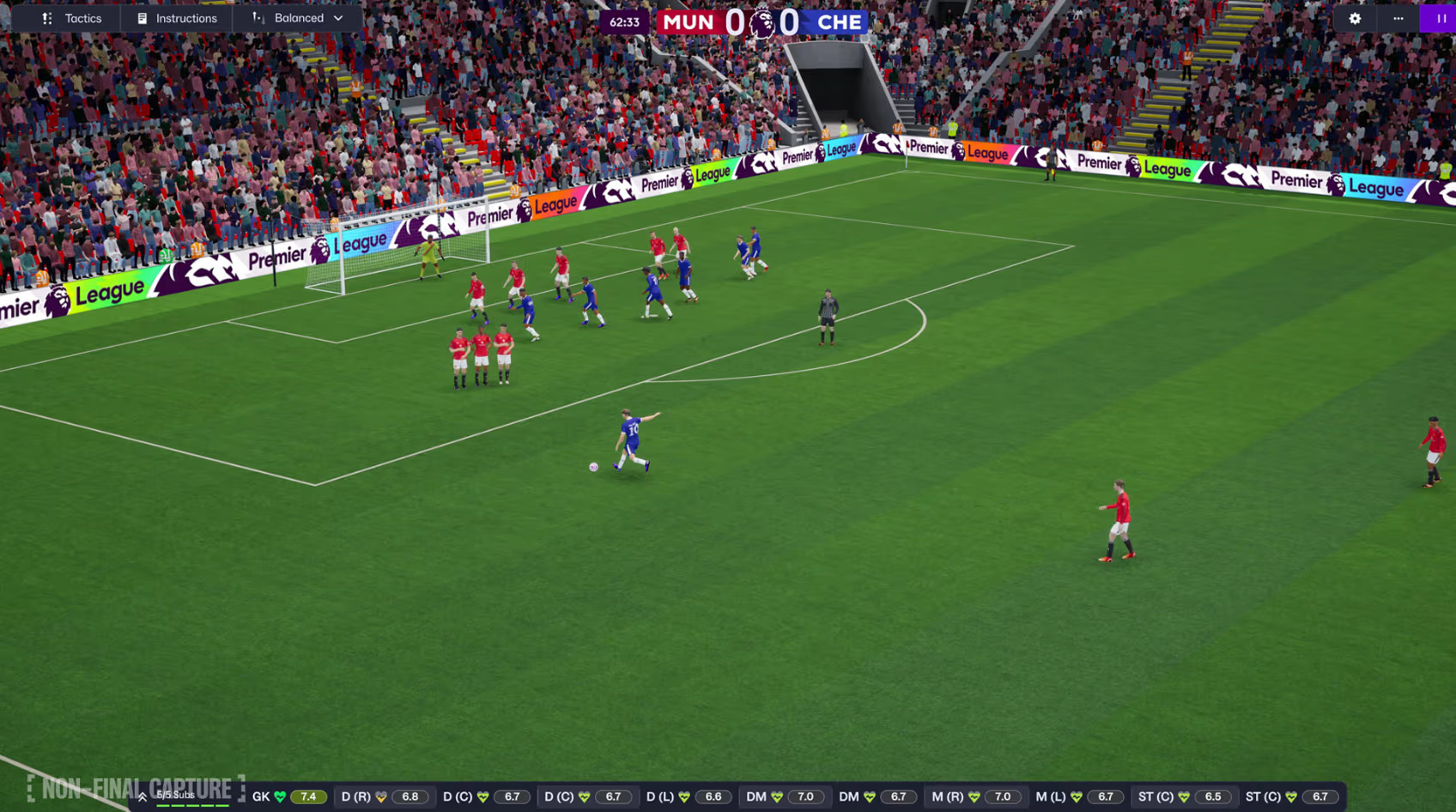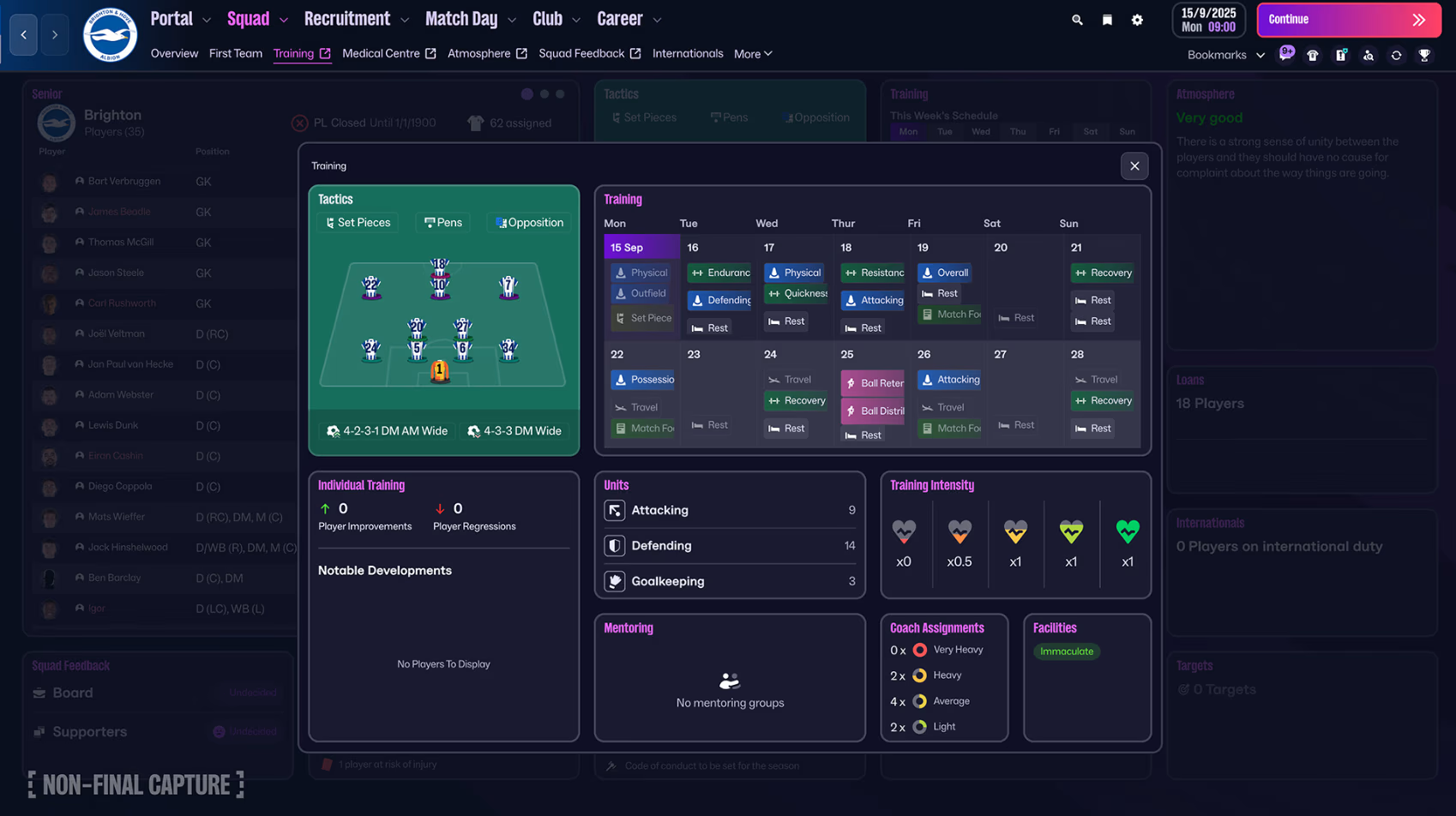PC
Mobile
PS5
Xbox Series
Switch
It’s been a long time.
For me, and for millions of others, the release of Football Manager — or Championship Manager as it was when I started playing in the early 90s — has been an annual ritual. It's the game that sees you realising it’s already 03:47 in the morning and convinces perfectly rational people that yes, they could get Wrexham to a Champions League final with the right False Nine (or the right Hollywood owners). Last year, for the first time in the series’ history, that ritual didn't happen. The stands were empty. The pitch was silent.
The reason, of course, was monumental. Sports Interactive, the developers, had made the massive decision to move the entire series to the Unity engine. This wasn't just a new coat of paint. It was a full, down-to-the-studs rebuild. In the game's long history, this move represents one of the three biggest moments of its life: the original Championship Manager split, the first-ever 3D match engine, and this. The move wasn’t meant to take this long; FM 25 did exist, but it was never released.

The promise was a revolution, particularly for the long-maligned 3D match engine. The two-year wait was, we were told, necessary to make it all work. It was supposed to be the glorious next generation. So it’s no surprise that Football Manager 26, the product of that two-year cycle, is rough. What is surprising — and deeply frustrating — is that the roughness isn't just in the new places. It's everywhere.
We reviewed the beta version of the game, and let’s get this out of the way: it is buggy. There are literally hundreds of glitches, visual oddities, and data errors. But even if we charitably discount those, even if we assume patches will smooth out the most glaring technical flaws, the core experience around the matches is, for the first time I can remember, not very good.
Football Manager in its prime was a glorious thing. The beauty of its complex systems — training, recruitment, scouting, contracts — was that you could dive as deep as you wanted. You could spend three hours crafting the perfect training schedule for your U18s, or you could delegate it all to your Assistant Manager and never look at it again. It was a world of glorious, customisable fun.
You can still delegate in FM26, but in many cases, you wouldn't want to. Not because your staff are incompetent, but because trying to do it yourself is a navigational nightmare. The whole experience of managing a club between match days has become a painful slog. I lost count of how many times I struggled to find the "Roles and Responsibilities" screen, a fundamental part of delegation. It's buried in a menu that makes no intuitive sense.

It's not just navigation; it's the sheer number of pointless interactions required to do simple things. Take the pre-match press conference. You get the inbox item. You click "Go to Press Conference." This takes you to a new screen, where you then have to click another button to "Start" the conference. You click through the questions, and when you're done, you're presented with two buttons to leave. One of them, bafflingly, doesn't actually take you away from the screen. This is a tiny example, but it’s indicative of a thousand tiny, superfluous button presses that have been layered onto the game, turning swift management into a bureaucratic crawl.
After a while, my enthusiasm for engaging with these systems evaporated. I stopped tweaking individual training. I stopped managing my scouting assignments. I automated everything I could, not because I wanted to streamline my experience, but because I wanted to avoid the hassle and frustration of the new interface.

And this is what makes the whole experience so heartbreaking. I’ve been playing this series since Championship Manager in the early 90s. For me, the joy was never just the match. It was the thrill of the hunt — digging through scouting reports, unearthing a 16-year-old wonderkid, negotiating a complex contract, and building a world-class backroom staff. Player and staff recruitment is a massive part of what I love. But now, because the process of doing those things is so tedious, that joy is gone. It's buried under bad menus and pointless clicks. This is made even worse by new "features" like the TransferRoom integration. This should have been a great addition, but instead it feels like unneeded, simplistic hand-holding when I first start at a club. I know what I want; I don't need the game to help me out, and it's all wrapped in the same clunky, frustrating UI. The strange, compulsive pull of "just one more match" is still there, compelling me forward, but I can't truly enjoy the full thing when the vital connective tissue of the game — everything I love doing between matches — has been made so unenjoyable.
Thankfully, there are still some triumphs.
When you finally get to the match day, when the whistle blows, that game is still here. The fundamental match logic, the brains of the simulation, seems to have survived the transition from the old engine. My tactical changes had a visible, logical effect. My Inside Forward cut inside, my Ball-Winning Midfielder crunched into tackles, and the flow of the game felt authentic (bizarrely, some peripheral features like 'shouts from the touchline' have vanished, which feels like a strange step back).
But it’s not just survival; there’s one new addition here that is truly massive. It’s the single best new feature in a decade: the formal introduction of "in possession" and "out of possession" tactics.

This is it. This is the holy grail for fans of real, modern football. For the past decade, we've watched Guardiola and Klopp, and we've heard them talk about how static formations don't really matter. It's all about roles, spaces, and what you do in different phases of play. Football Manager 26 finally understands this. You can now explicitly set your team to play a 4-3-3 in defence, which fluidly morphs into a 3-4-3 diamond when you have the ball. You can have your wing-backs push up to become midfielders, or your striker drop deep to become a creator, all as part of a defined, possession-based instruction.
It brings a whole new, delicious flavour to the already tasty tactical side of the game. It adds a depth that genuinely reflects the football we watch on television, and it’s the one part of the game that makes this feel like a true, next-gen Football Manager. It’s a glimpse of the masterpiece this engine could one day power.
Of course, the other, much-hyped part of the Unity move was the graphics. While the match-day experience is improved, with better lighting and animations, it still looks stuck in the past. Yes, this will vary depending on your PC specs, but compared to EAFC or, frankly, any other contemporary sports title, it's not even in the same league. The players still look like slightly uncanny puppets, and the stadiums feel sterile. After a two-year wait for a graphical revolution, it's a letdown.
But then the match ends, and you’re dumped back into the UI.

We haven’t fully touched on the UI and UX, but as I’ve said, it is rough. The reason for it seems clear: Sports Interactive is seemingly trying to combine all versions of FM into one unified experience. This interface has to work on a console controller, and maybe even on a mobile or tablet. The result is an experience that is hopelessly compromised for its core, PC audience.
Menus are larger, information density is lower, and the reliance on 'controller-friendly' blocks rather than 'mouse-friendly' lists is everywhere. At the end of the day, Football Manager is one of the best-selling and most-played PC games on the planet. It is a quintessential mouse-and-keyboard title. It should be, and must be, built to be PC-first. To have it feel like a clunky console port after a two-year delay to build a new engine is not a good look.
This sense of being underwhelmed extends to the game's other headline additions. The much-publicised introduction of women's football is, in this first iteration, a welcome but bare-bones database. The "evolving storytelling" of the match day experience adds some flavour text but doesn't fundamentally change anything. The impact of these major new features, features that should have been celebrated, is completely muted by the sheer frustration of just playing the game.
It leaves Football Manager 26 in a bizarre, frustrating limbo. The actual football management — the tactical core of the game — is smarter and deeper than it has ever been. But Football Manager has always been more than just a match engine. It’s the intricate, obsessive world around the pitch. In its current state, that world is broken, or at least a chore to live in.
This new engine has a phenomenal amount of promise, but this release feels like a star player who has been rushed back from injury. You can see the flashes of world-class brilliance, but the fitness, the sharpness, and the basics just aren't there yet. We can only hope that Football Manager 27 — or a very, very long series of patches — finally sees this new era find its form.
You can subscribe to Jump Chat Roll on your favourite podcast players including:
Let us know in the comments if you enjoyed this podcast, and if there are any topics you'd like to hear us tackle in future episodes!



